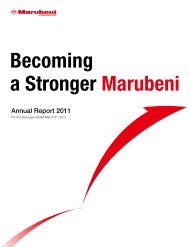Trust Recovery Growth Vitalization - Marubeni
Trust Recovery Growth Vitalization - Marubeni
Trust Recovery Growth Vitalization - Marubeni
You also want an ePaper? Increase the reach of your titles
YUMPU automatically turns print PDFs into web optimized ePapers that Google loves.
Management’s Discussion and Analysis of Financial Position and Business Results<br />
While <strong>Marubeni</strong> believes these estimates to be reasonable,<br />
unforeseeable changes to the terms and criteria used could result<br />
in a reassessment of projected cash flows, which could significantly<br />
impact the Company’s consolidated financial statements.<br />
Deferred tax assets<br />
In their financial statements and for tax purposes, <strong>Marubeni</strong> and<br />
its consolidated subsidiaries post transitional differences and<br />
losses carried forward as deferred tax assets. Regarding transitional<br />
differences and losses carried forward lowered due to future<br />
tax changes, a valuation allowance is posted for the portion for<br />
which realization is deemed unlikely, with deferred tax assets<br />
reduced accordingly. The projected amount of future tax to be<br />
collected is estimated based on future applicable income taxes<br />
and tax strategies.<br />
While <strong>Marubeni</strong> believes these estimates to be reasonable,<br />
unforeseeable changes to the terms and criteria used could result<br />
in a reassessment of the projected amount of tax to be collected,<br />
which could significantly impact the Company’s consolidated<br />
financial statements.<br />
Retirement benefit expenses<br />
<strong>Marubeni</strong> and its consolidated subsidiaries utilize actuarial pension<br />
accounting based on pre-established criteria to calculate severance<br />
pay and pension obligations for regular employees. These<br />
pre-established criteria include the discount rate, the retirement<br />
rate, the mortality rate, the rate of salary increase, and the rate of<br />
expected return on pension assets.<br />
While <strong>Marubeni</strong> believes these estimates to be reasonable,<br />
unforeseeable changes to the criteria used could significantly<br />
impact the Company’s consolidated financial statements.<br />
New accounting standards<br />
In March 2004, the Financial Accounting Standards Board issued<br />
FASB Emerging Issue Task Force Issue 04-2, “Whether Mineral<br />
Rights Are Tangible or Intangible Assets” (EITF 04-2). In this<br />
regard, the FASB also issued FASB Staff Position (FSP) No. 141-1<br />
and No. 142-1, which amend SFAS 141 and 142.<br />
Pursuant to EITF 04-2 and FSP 141-1 and 142-1, all mining<br />
rights, which were previously classified as intangible assets, have<br />
been reclassified under “Mining rights” and “Accumulated<br />
depreciation” under “Property, plant and equipment, at cost” in<br />
the consolidated balance sheets.<br />
5 Off-balance sheet arrangements and<br />
contractual obligations<br />
<strong>Marubeni</strong> guarantees debt of affiliated companies and third parties<br />
in the ordinary course of business. Should the guaranteed parties<br />
fail to make payments, the Company would be required to make<br />
such payments under these guarantees. The term of the guarantees<br />
is basically one year. The related guarantee fees are primarily<br />
received quarterly or semi-annually. Certain of these guarantees<br />
were secured by guarantees issued to the Company by other<br />
parties. The outstanding balance of guarantees, which approximated<br />
the maximum potential payment under these guarantees,<br />
was ¥96,806 million, including ¥42,183 million to affiliated companies,<br />
as of March 31, 2005, net of the amount secured by guarantees<br />
issued to the Company by other parties of ¥17,246 million. In<br />
the year ended March 31, 2004, these figures were ¥180,230<br />
million, ¥110,557 million and ¥19,507 million, respectively.<br />
6 Significant Policies<br />
<strong>Marubeni</strong> launched a three-year medium-term management plan,<br />
the “V” PLAN, in April 2003. The management policies formulated<br />
in the “V” PLAN aim to forge the Company into a resilient group<br />
possessing the top operational units and business portfolio in the<br />
industry. The ultimate goal is to strengthen the Company’s<br />
earnings base and improve its financial position primarily through<br />
stronger portfolio management and by placing renewed emphasis<br />
on risk-return profiles. Currently, <strong>Marubeni</strong> is redoubling efforts to<br />
achieve the objectives of the “V” PLAN in the run-up to its<br />
scheduled conclusion in the fiscal year ending March 31, 2006.<br />
From an economic, environmental and social perspective, the<br />
<strong>Marubeni</strong> Group recognizes that the support of its diverse<br />
stakeholders is crucial to conducting its business activities.<br />
Accordingly, the Group pursues activities in a manner that will<br />
mutually benefit and satisfy its customers, business partners,<br />
shareholders, employees and the local communities where it<br />
operates. At the same time, the Group implements sound<br />
management that gives due concern to protecting the natural<br />
environment, with the goal of developing a stable and sustainable<br />
base for Group operations. From a qualitative standpoint as well,<br />
the Group continues to promote stronger corporate governance


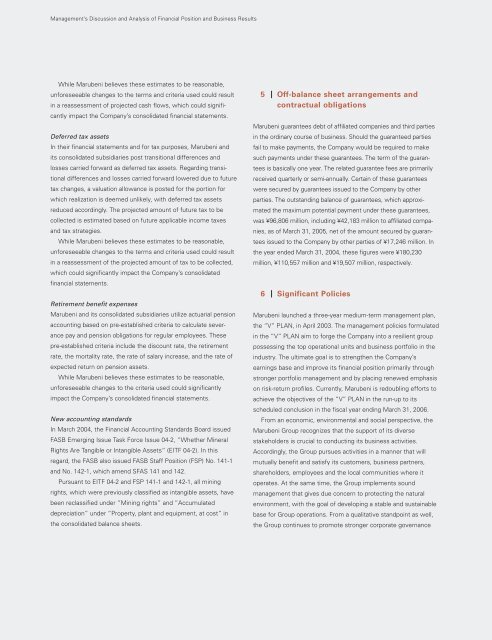
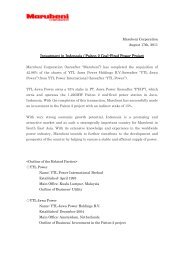
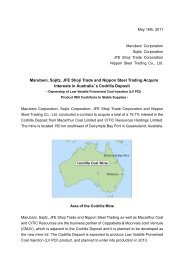
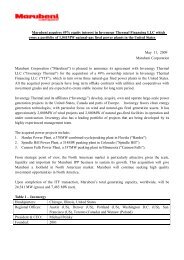

![[Chapter 2] Driving Growth: Expansion Under SG-12 - Marubeni](https://img.yumpu.com/4161147/1/190x248/chapter-2-driving-growth-expansion-under-sg-12-marubeni.jpg?quality=85)
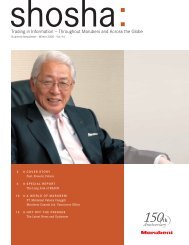
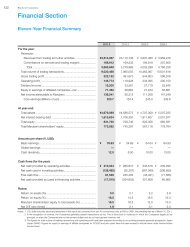
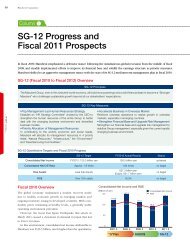
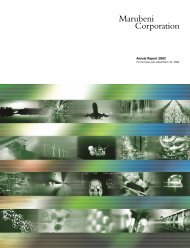
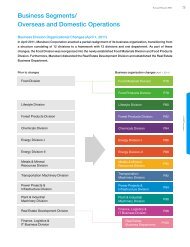
![[Chapter 4] Delivering Growth - Marubeni](https://img.yumpu.com/3464783/1/190x248/chapter-4-delivering-growth-marubeni.jpg?quality=85)
